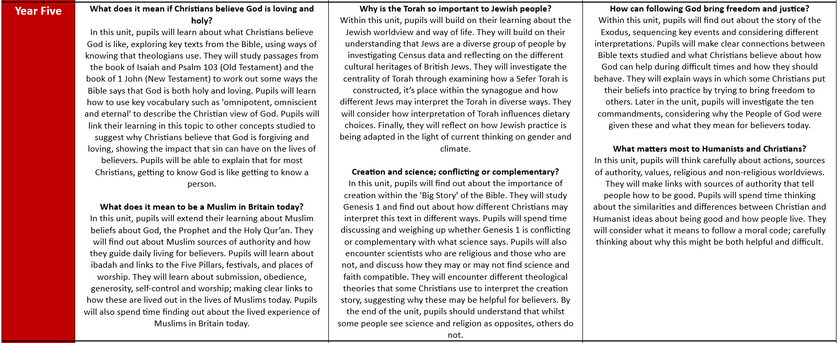
Building each other up - with God as our firm foundation Thessalonians 5: 11

RE


At St Paul’s, we want all children to enjoy R.E and take the opportunity to reflect upon different religious faiths whilst developing a thirst for knowledge and wisdom. We want all children to understand the core importance of RE as an academic subject and how it helps us value and respect the diverse cultures and faiths represented in our school, local community and in our world. We want children to build respect and tolerance of various beliefs and encourage articulate and respectful dialogue about beliefs. We aim for all children to learn how to disagree well and talk about their own, and other, beliefs in a respectful and appropriate way. We want children to be able to reflect on their own experiences and develop a personal response to the fundamental questions of life. In particular, our RE curriculum enables children to know about and understand Christianity as a living world faith, by exploring core theological concepts. It enables children to develop knowledge and skills in making sense of biblical texts and in understanding their impact in the lives of Christians. The teaching of RE helps us live out our school vision and values: through learning about and celebrating our diversity and individuality we are ‘Building Each Other Up.’

-
The school follows the Understanding Christianity syllabus which ensures that as the children move up the school they learn about new key concepts and also go into preciously learnt concepts in greater depth.
-
Three strands run through all Understanding Christianity units:
-
Making sense of the Text – A Biblical Text is shared
-
Understanding the Impact – how does the text impact a Christian’s beliefs and actions?
-
Making Connections - children are encouraged to discern possible connections between the concepts studied and their own lives.
-
All year groups also learn about other major world faiths following schemes of work provided by the Diocese – with a focus on Judaism and Islam and the faith represented within their class.
-
The school has adapted the assessment frameworks of Undertaking Christianity and the other world faith units to embrace an inquiry-based learning approach.
-
Each assessment grid for each unit has questions which drive the learning forward and help develop understanding and reflective skills. All the questions contribute to the overarching key question for the unit.

Children who:
-
Are excited and value the learning opportunities that they are given
-
Reflect on various religious beliefs and discerning what they may be able to learn from those beliefs.
-
Have a good understanding of the core concepts of the Christian faith and how they link together.
-
Have a good understanding of the core concepts of other major world faiths.
-
Show respect for everyone regardless of beliefs.
-
Know how to voice disagreements in a respectful, appropriate way using sources to reinforce their opinions
RE Learning Journey:









